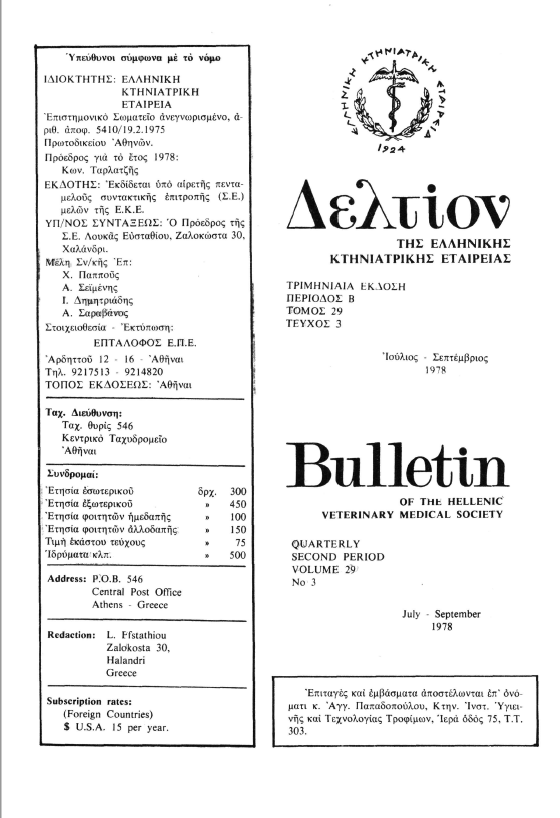Inhibition of Ovulation in Ewes after chloropramazine (largactil) Administration
Abstract
An experimental research was carried out in June 1976 on ewes of the High Argicultural College of Athens, to find out the efficacy of ehloropromazine administration in the inhibition of ewes ovulation. 8 ewes were used for the expriment divided in 2 same number groups. Sponges impregnated with 50 mg M.A.P. (Vet. cycle) were put in the vagina of all ewes. 12 days after placing the sponges 500 i.u. Pregnant mare serum gonadotrophin (P M S G) were injected to each ewe and two days later the sponges were removed. The day of sponges removal as well as the next two days 50, 40 and 25 mg ehloropromazine were injected respectively to each ewe of the experimental group. 6 days after Ρ M S G treatment the were slaughtered. The percetage of ovulation inhibition in the ewes treated by ehloropromazine was 75% with fuliy mature fol ides. 100% of the controls had corpus luteum.
Article Details
- How to Cite
-
ΤΣΑΜΗΣ K., & ΛΟΥΚΕΡΗΣ Α. (2019). Inhibition of Ovulation in Ewes after chloropramazine (largactil) Administration. Journal of the Hellenic Veterinary Medical Society, 29(3), 186–190. https://doi.org/10.12681/jhvms.21354
- Issue
- Vol. 29 No. 3 (1978)
- Section
- Articles

This work is licensed under a Creative Commons Attribution-NonCommercial 4.0 International License.
Authors who publish with this journal agree to the following terms:
· Authors retain copyright and grant the journal right of first publication with the work simultaneously licensed under a Creative Commons Attribution Non-Commercial License that allows others to share the work with an acknowledgement of the work's authorship and initial publication in this journal.
· Authors are able to enter into separate, additional contractual arrangements for the non-exclusive distribution of the journal's published version of the work (e.g. post it to an institutional repository or publish it in a book), with an acknowledgement of its initial publication in this journal.
· Authors are permitted and encouraged to post their work online (preferably in institutional repositories or on their website) prior to and during the submission process, as it can lead to productive exchanges, as well as earlier and greater citation of published work.



